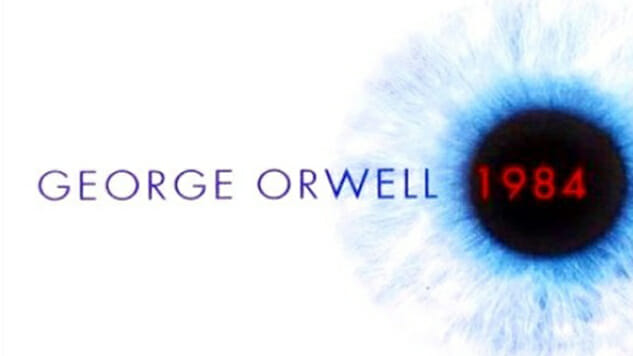10 Songs Inspired by George Orwell’s 1984

Consumer reports can tell you a lot about society. South Korea’s decriminalization of adultery made condom sales skyrocket in 2015. In December of 1999, Americans bought record amounts of bottled water for fear of Y2K. In 2017, we’re busy buying George Orwell’s dystopian masterpiece, 1984.
Just a few weeks ago, Trump’s counselor Kellyanne Conway made that cringeworthy remark about Sean Spicer offering “alternative facts” regarding inauguration attendance figures. As always, the Internet was swift to retaliate, this time using Orwell as ammo. Tweeters invoked idioms from 1984 such as “doublethink” and “newspeak” to describe Conway’s farcical perversion of language.
First published in 1949, 1984 scrutinizes an authoritarian government whose control has extended to the minds of its people. Independent thought is all but eradicated and facts are distorted beyond recognition. Given the current political climate, it only makes sense that readers would heed the novel’s forecast—and its recent 9,500% spike in sales speaks to that. But before Orwellian lingo was emblazoned across social media, the book’s themes found a home in rock n’ roll throughout the decades. From punk rock to rap, David Bowie to Stevie Wonder, here are 10 of the best songs inspired by George Orwell’s 1984.
1. David Bowie, “1984”
Released on Diamond Dogs, David Bowie’s theatrical “1984” came out a decade before its title year. Bowie was so taken with the book that he initially wanted to write a musical interpretation of it. Conflicts with the Orwell estate, however, thwarted his plans. “I know the impetus for Diamond Dogs was both Metropolis and 1984,” Bowie told Rolling Stone in 1987.
The song pays worthy homage to the book. Despite his glam plumage, Bowie could do dreary nihilism with the best of ‘em. “1984” maintains the novel’s oppressive weight, honing in on Orwell’s depiction of thought control, specifically the state-issued propaganda which makes intellectual amputees of its citizens. “They’ll split your pretty cranium / and fill it full of air,” Bowie cries over eerie, high-strung strings. “And tell you that you’re eighty, but brother, you won’t care / You’ll be shooting up on anything, tomorrow’s never there/ Beware the savage jaw / of 1984.”
2. Subhumans, “Big Brother”
Punks love 1984. It is perhaps the only book referenced more in the punk rock canon than A Clockwork Orange. Written on the heels of the actual year 1984, “Big Brother” communicates a frustration with Thatcher-era Britain—a popular target for punk music at the time. Here Subhumans leverage the text’s portrayal of mass surveillance (i.e. “telescreens” in the novel) to comment on the brainwashing effect of mainstream media: “Here we are in a new age / Wishing we were dead,” shouts lead singer Dick Lucas. “There’s a TV in my front room /And it’s screwing up my head.”
While it might not be as lyrically eloquent as Bowie’s work, the song speaks to the anxiety that results from heightened scrutiny and fear mongering. The chorus demands, “And somebody told me / Big Brother’s watching you / And somebody else said /‘You know it’s not true’/ Who do you believe?” Ironically enough, both Orwell and Subhumans predicted the swarm of surveillance watching modern-day British citizens; as of 2011 there was one CCTV camera for every 32 people in the U.K.
3. Eurythmics, “Ministry of Love”
Eurythmics’ infectious pop songs weren’t simply made of “sweet dreams.” Annie Lennox and company didn’t stop at a song, but wrote an entire soundtrack to the 1984 film adaptation of 1984. “Ministry of Love” is a particularly eerie track. In the book, Orwell’s narrator describes the Ministry of Love as “the really frightening one” of the four Ministries (Truth, Love, Peace and Plenty). “Miniluv” as it is abbreviated, “maintained law and order” in the book’s fictional state of Oceania.
The Eurythmics’ song is more potent in composition than language, as the only lyrics are droning repetitions of “The Ministry of Love.” Sonically it is domineering and sinister; sterile drum machines and synths march under mechanical vocals. A frightening noise, which recalls a squealing pig, weaves in towards the end—maybe a slight allusion to the constant and laborious production of pig iron in the novel.
-

-

-

-

-

-

-

-

-

-

-

-

-

-

-

-

-

-

-

-

-

-

-

-

-

-

-

-

-

-

-

-

-

-

-

-

-

-

-

-








































